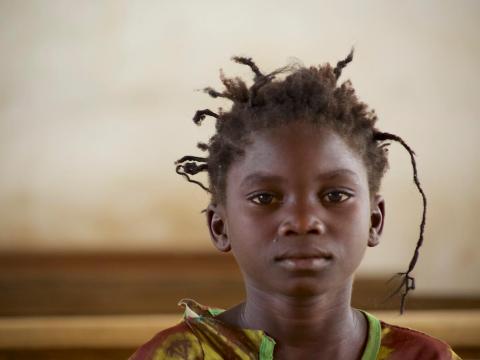An impossible choice: hunger or conflict

Conflict kills… but so does hunger.
In the Central African Republic (CAR), displaced children like eight-year-old Melvina are forced to weigh up the odds of which life-threatening situation they will be subjected to. Sometimes the risk of going out to find food is too dangerous due to ongoing conflict, but the risk of suffering malnutrition is just as worrying.
"I don't eat every day because my mother has no money,” says eight-year-old Melvina who was forced from her home and is now living at a site for displaced people in Bouar. “When I don't eat, I have a headache and a stomach ache and I can't go to school.”
In the Central African Republic years of conflict between the government, armed rebels, and militias, who all stake a claim to various territories means that almost two thirds of the country are in desperate need of humanitarian support.
Children like Melvina need everything from education to health clinics to safe places to play. But before all of that is the critical need of lifesaving food. Melvina can’t play with her friends on an empty stomach. And when she's hungry she stays home from school because she is too tired. Malnutrition robs her of the chance to succeed, trapping her inside her own body.
The decision to trade the risk of death in conflict for the risk of death through malnutrition is a choice no mother should have to make. But Melvina’s mother, Zenou, makes it daily, as she wages threats from every angle. In addition, a changing climate means crops aren’t even a certainty. “I try to cultivate the fields to feed Melvina,” she says. “But as the crops are not regular, it is sometimes difficult.”
So where does World Vision fit in a situation as complex as faced by those who live in the Central African Republic? Our response differs greatly from country to country and community to community because it needs to be flexible to each community’s unique needs. This flexibility is even more important in fragile places like CAR where the conditions are always changing.
Even when conditions change, communities are always striving for self-sufficiency, so even though our interventions might differ from place to place, the goal of stabilizing a community and working towards self-sufficiency remains the same. Our experience has shown that with the right support, even displaced communities in the grips of hunger, can become strong and self-sufficient again. And very often food is the first step.
As the largest implementing partner of the World Food Programme (WFP), World Vision has been a global leader in food assistance for years. Because we are well-established and trusted in the regions where we work, we are able to deliver food quickly and efficiently, preventing wide scale death and pulling children back from the edge of starvation.
Our feeding centres in CAR are no exception. “Thanks to WFP and World Vision, Melvina gets rations at school to take home,” says Zenou. “It helps us make ends meet.”
But that’s not where Melvina’s journey with World Vision ends. Though crucial, food is just the first step towards strengthening communities. This is why in 2014 we launched child-friendly spaces across the country, where children can play and learn safely. In CAR these also serve as peace clubs, to help children like Melvina cope with the trauma of conflict and build social cohesion with their peers.
It’s why we facilitate workshops on child protection and work alongside faith leaders from multiple faiths to work together to care for children. And it’s why we’ve developed peacebuilding materials to use in classrooms.
But none of this is possible without food. If people are hungry and sick, their ability to engage in peacebuilding initiatives is hindered. Food can be what opens that first door towards a stronger community.
Right now 45 million people are on the brink of starvation, but just $38 can provide a month of life-saving food for a family and enable communities to become stronger in the face of crisis. The time to act is now.